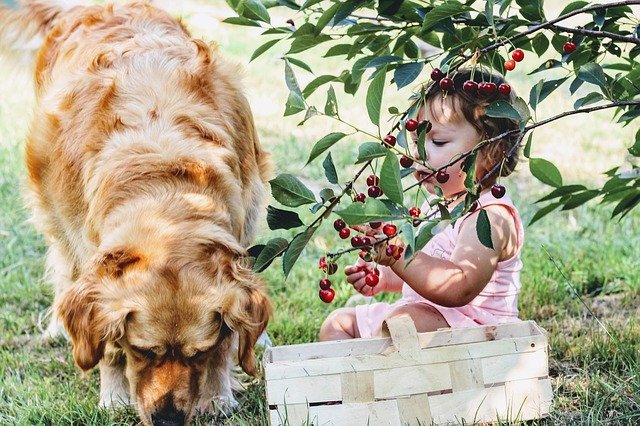Which Fruits are Harmful for Dogs?
Here’s some Info you need to know to keep your pup away from Fruits that are harmful.
Humans are encouraged to make fruit a regular part of our diet and sure, we like to share our treats with our canine companions, but what fruits are harmful for dogs? Always consult your veterinarian if you’re not sure, and while this list is not exhaustive, here’s a quick rundown of some common fruits to watch out for.
1. Citrus fruits can be a harmful fruit
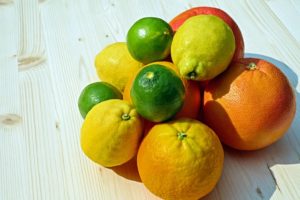
Most citrus fruits are great for us, but Grapefruit, Lemons and Limes can all be harmful for Fido. They’re highly acidic which can upset their tummys causing diarrhea, vomiting and depression. Seeds, rind and plants are all toxic, so these should absolutely be avoided. Oranges, clementines, tangerines etc. should be okay in small quantities, however they can cause issues for your diabetic pup, so best overall to limit citrus fruits, even the ones that are okay. There are other alternative fruits that you won’t have to worry so much about.
2. Raisins and Grapes (and other dried fruits)
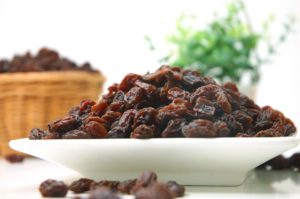 Although the reasons for their toxicity are not clear, raisins and grapes can cause renal issues and quickly turn to kidney failure, even in small quantities, often irreversible. This will depend on the size of your dog, and the amount consumed, but here’s another category that should be avoided. Other dried fruits, though not as toxic, have concentrated sugars in the dried variety, and can be just too much sugar for a dog’s system. The fresh versions are mostly okay, but grapes are always a no-no.
Although the reasons for their toxicity are not clear, raisins and grapes can cause renal issues and quickly turn to kidney failure, even in small quantities, often irreversible. This will depend on the size of your dog, and the amount consumed, but here’s another category that should be avoided. Other dried fruits, though not as toxic, have concentrated sugars in the dried variety, and can be just too much sugar for a dog’s system. The fresh versions are mostly okay, but grapes are always a no-no.
3. Are Avocados Harmful Fruit?
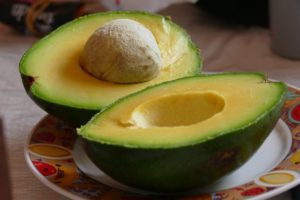 Who doesn’t love a fresh bowl of guacamole with our favorite chips and some hot sauce? Well, Spot may want to give it a go, but best to steer clear of any parts of an avocado when it comes to dogs. There is some debate about it, because avocado can be great for their skin and coats, but as avocado parts contain Persin, poisonous to some animals, (though not apparently to dogs or cats), the skin, pits and even the fruit can cause upset stomach, diarrhea and even breathing problems. Small quantities can be okay, and if your pup tolerates small quantities well, keep on, but be sure to monitor them, and if not you’re currently not feeding, certainly start out slowly. Be sure they don’t get any of the skin/peel or the pit though. Again, lots of better alternatives with fewer possible side effects.
Who doesn’t love a fresh bowl of guacamole with our favorite chips and some hot sauce? Well, Spot may want to give it a go, but best to steer clear of any parts of an avocado when it comes to dogs. There is some debate about it, because avocado can be great for their skin and coats, but as avocado parts contain Persin, poisonous to some animals, (though not apparently to dogs or cats), the skin, pits and even the fruit can cause upset stomach, diarrhea and even breathing problems. Small quantities can be okay, and if your pup tolerates small quantities well, keep on, but be sure to monitor them, and if not you’re currently not feeding, certainly start out slowly. Be sure they don’t get any of the skin/peel or the pit though. Again, lots of better alternatives with fewer possible side effects.
4. What about Tomatoes?
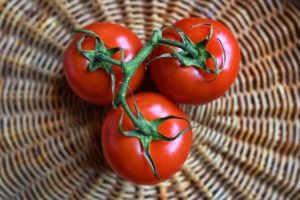 Tomatoes are within the nightshade family of vegetables, and the plants contain some components that are harmful to certain animals, like dogs, including solanine. Solanine, is a substance found in stems and leaves of tomato plants an is harmful to dogs in large quantities. Luckily, for dogs that enjoy the occasional tomato, solanine is usually concentrated within the green parts of the tomato . The leaves, stems, and young, green tomatoes contain higher amounts of solanine than ripe fruit, which suggests that ripe tomatoes are generally safe to feed to dogs. This is often still problematic for those that like to raise tomatoes in the garden, so we have to emphasize the importance of preventing our dogs from eating green tomatoes or chewing on the stem and leaves. If you’re concerned your pooch may have gotten into some green tomatoes or the plants themselves, keep an eye out for upset stomach, loss of coordination, muscle weakness, tremors/seizures, and contact your vet if any of these are present. Thankfully, tomato poisoning prognosis is generally good.
Tomatoes are within the nightshade family of vegetables, and the plants contain some components that are harmful to certain animals, like dogs, including solanine. Solanine, is a substance found in stems and leaves of tomato plants an is harmful to dogs in large quantities. Luckily, for dogs that enjoy the occasional tomato, solanine is usually concentrated within the green parts of the tomato . The leaves, stems, and young, green tomatoes contain higher amounts of solanine than ripe fruit, which suggests that ripe tomatoes are generally safe to feed to dogs. This is often still problematic for those that like to raise tomatoes in the garden, so we have to emphasize the importance of preventing our dogs from eating green tomatoes or chewing on the stem and leaves. If you’re concerned your pooch may have gotten into some green tomatoes or the plants themselves, keep an eye out for upset stomach, loss of coordination, muscle weakness, tremors/seizures, and contact your vet if any of these are present. Thankfully, tomato poisoning prognosis is generally good.
5. Some parts of Rhubarb can be harmful
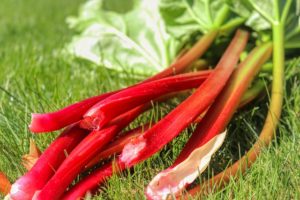 When I was growing up in New England, one of my best friend’s dad always had rhubarb plants in his garden and one of our favorite treats was to wash the stalks and then sprinkle with sugar and just snack away. It was tart from the rhubarb and sweet from the sugar, so a great balance. But what about Spot? While the stalks contain fiber, vitamin C and beneficial minerals and not toxic, the leaves are very much so, containing calcium oxalate crystals and oxalic acid toxic to both dogs and humans. They’d not likely eat enough to cause too much harm as they’re very bitter, but try to keep them away from this plant. Don’t panic if she grabs a bit of the stalk while you’re making that rhubarb pie, but if you see symptoms like drooling, vomiting, diarrhea, tremors, weakness or bloody urine after a suspected encounter with rhubarb, get in touch with your vet right away.
When I was growing up in New England, one of my best friend’s dad always had rhubarb plants in his garden and one of our favorite treats was to wash the stalks and then sprinkle with sugar and just snack away. It was tart from the rhubarb and sweet from the sugar, so a great balance. But what about Spot? While the stalks contain fiber, vitamin C and beneficial minerals and not toxic, the leaves are very much so, containing calcium oxalate crystals and oxalic acid toxic to both dogs and humans. They’d not likely eat enough to cause too much harm as they’re very bitter, but try to keep them away from this plant. Don’t panic if she grabs a bit of the stalk while you’re making that rhubarb pie, but if you see symptoms like drooling, vomiting, diarrhea, tremors, weakness or bloody urine after a suspected encounter with rhubarb, get in touch with your vet right away.
6. Figs, what?
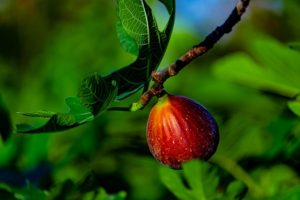 Figs are one of the fruits that can be okay in very small moderation. They’re filling, high in fiber so can help with colon acitivity or weight problems, and contain potassium which can help with blood pressure. Some dogs though are very sensitive to the fruit and can experience unpleasant side effects after eating them. Figs contain enzymes ficin and ficusin which can be too strong for you pups tummy to handle. They can develop stomach upset, diarrhea and vomiting. More severe reactions include rashes, sores, even inflammation on their tongues or in their mouth. If your dog experiences any of these, stop the figs immediately and monitor them to be sure the symptoms don’t get worse. While home treatment generally helps, be prepared for a trip to the vet if symptoms get worse or persist. According the the ASPCA fig plants are highly toxic, leading to life-threatening toxicity.
Figs are one of the fruits that can be okay in very small moderation. They’re filling, high in fiber so can help with colon acitivity or weight problems, and contain potassium which can help with blood pressure. Some dogs though are very sensitive to the fruit and can experience unpleasant side effects after eating them. Figs contain enzymes ficin and ficusin which can be too strong for you pups tummy to handle. They can develop stomach upset, diarrhea and vomiting. More severe reactions include rashes, sores, even inflammation on their tongues or in their mouth. If your dog experiences any of these, stop the figs immediately and monitor them to be sure the symptoms don’t get worse. While home treatment generally helps, be prepared for a trip to the vet if symptoms get worse or persist. According the the ASPCA fig plants are highly toxic, leading to life-threatening toxicity.
7. Jalapenos (Just Don’t)
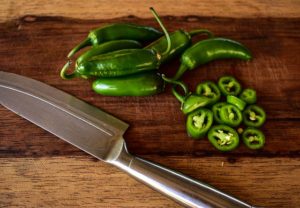 Yes they are considered fruit, and no they aren’t toxic (but one could argue painful), but so spicy, why would you want to? That said, I bet there’s someone out there who will comment that their pooch is muy caliente and loves them, but I wouldn’t. I love them myself and eat them on and with everything, but for Sunny, not so much.
Yes they are considered fruit, and no they aren’t toxic (but one could argue painful), but so spicy, why would you want to? That said, I bet there’s someone out there who will comment that their pooch is muy caliente and loves them, but I wouldn’t. I love them myself and eat them on and with everything, but for Sunny, not so much.
8. Fruit Loops are a harmful fruit
Just kidding. You know those aren’t real fruit, right?
Well the good news is that the list of harmful fruits and those that can cause discomfort is much smaller that the list of fruits we can share with our furry friend, so be sure to check out that list as well. Have we missed any of your favorites? Leave us a comment below of some fruits you share with you best friend, or ones you avoid. We always love getting feedback as well.
El Jefe.

